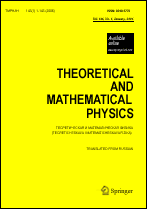|
This article is cited in 3 scientific papers (total in 3 papers)
A group theory derivation of the relativistic path integral and the “history-string” dynamics
M. B. Menskii
Lebedev Physical Institute, RAS, Moscow, Russia
Abstract:
We derive the Feynman path integral for relativistic elementary particles using group theory considerations. We apply an approach in which choosing a symmetry group (or semigroup) allows deriving the kinematics and dynamics of a particle including the state space and the propagator from it. The quantum properties of a particle appear from intertwining two representations of the symmetry (semi)group, one of which describes local properties of the particle and the other describes the particle as a whole. The path-integral-like dynamics appears when the symmetry semigroup has a structure similar to that of the relativistic analogue of the Galilei group (in which the Lorentz-invariant “proper time” plays the role of time) with translations replaced with the semigroup of trajectories (parameterized paths). The classical action in the weight functional of the path integral is defined by this semigroup up to couplings to gauge and/or gravitational fields. The obtained formalism is suitable for describing not only pointlike particles but also nonlocal objects of the “history-string” type, which, as previously shown, allow explaining quark confinement.
Keywords:
path integral, symmetry, path group, path-dependent function, quantum string.
Received: 24.05.2012
Citation:
M. B. Menskii, “A group theory derivation of the relativistic path integral and the “history-string” dynamics”, TMF, 173:3 (2012), 392–415; Theoret. and Math. Phys., 173:3 (2012), 1668–1686
Linking options:
https://www.mathnet.ru/eng/tmf8372https://doi.org/10.4213/tmf8372 https://www.mathnet.ru/eng/tmf/v173/i3/p392
|


| Statistics & downloads: |
| Abstract page: | 675 | | Full-text PDF : | 299 | | References: | 71 | | First page: | 32 |
|




 Contact us:
Contact us: Terms of Use
Terms of Use
 Registration to the website
Registration to the website Logotypes
Logotypes









 Citation in format
Citation in format 
